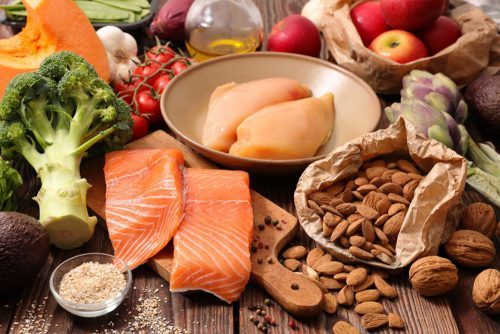PCOS NATURAL REMEDIES
Polycystic Ovary Syndrome (PCOS): Natural Solutions for Better Wellbeing
Polycystic Ovary Syndrome (PCOS) is a common hormonal disorder affecting millions of women worldwide, particularly those in their reproductive years. Characterized by irregular menstrual cycles, elevated levels of male hormones (androgens), and the presence of cysts on the ovaries, PCOS can lead to various complications, such as infertility, weight gain, acne, and an increased risk of developing type 2 diabetes and heart disease.
While there is no definitive cure for PCOS, natural remedies can play a significant role in managing symptoms and improving overall health. This article explores effective natural solutions for PCOS, focusing on dietary changes, herbal treatments, lifestyle adjustments, and stress management strategies. These holistic approaches aim to address the underlying causes of PCOS and restore hormonal balance, without relying solely on medications.
Understanding the Root Causes of PCOS
To manage PCOS effectively, it’s essential to understand its underlying causes. While the exact cause of PCOS remains unclear, several factors contribute to its development:
Insulin Resistance: Many women with PCOS experience insulin resistance, where the body's cells don't respond well to insulin. This leads to higher blood sugar levels and can trigger an overproduction of androgens.
Hormonal Imbalances: Excessive production of male hormones disrupts the normal functioning of the ovaries, leading to irregular or absent ovulation.
Inflammation: Chronic low-grade inflammation is common in women with PCOS and may contribute to insulin resistance and hormonal imbalances.
Genetics: A family history of PCOS can increase the likelihood of developing the condition.
By addressing these root causes, natural remedies can help alleviate symptoms and improve overall wellbeing.
Dietary Changes for Managing PCOS
Diet plays a crucial role in managing PCOS symptoms. A nutrient-dense, balanced diet can help regulate blood sugar levels, reduce inflammation, and support hormonal balance. Here are some dietary recommendations:
1. Choose Low Glycemic Index (GI) Foods
Low-GI foods help stabilize blood sugar levels and reduce insulin resistance. Examples include:
- Whole grains (quinoa, brown rice, oats)
- Legumes (lentils, chickpeas, black beans)
- Non-starchy vegetables (broccoli, spinach, kale)
- Fruits like berries, apples, and pears
2. Increase Fiber Intake
Fiber slows down the absorption of sugar and supports gut health. High-fiber foods include:
- Vegetables (carrots, Brussels sprouts, artichokes)
- Fruits with skins (apples, pears)
- Seeds (chia seeds, flaxseeds)
- Whole grains
3. Incorporate Healthy Fats
Healthy fats can help reduce inflammation and support hormonal balance. Good sources of healthy fats include:
- Avocados
- Nuts and seeds
- Olive oil
- Fatty fish (salmon, mackerel, sardines)
4. Limit Processed Foods and Sugar
Processed foods and sugary snacks can exacerbate insulin resistance and worsen PCOS symptoms. Opt for whole, natural foods instead.
5. Eat Anti-Inflammatory Foods
Anti-inflammatory foods can help reduce chronic inflammation associated with PCOS. These include:
- Turmeric (curcumin)
- Ginger
- Green tea
- Dark leafy greens
- Berries
Herbal Remedies for PCOS
Certain herbs have shown promise in managing PCOS symptoms by regulating hormones, improving insulin sensitivity, and reducing inflammation. However, always consult a healthcare provider before starting any herbal treatments.
Spearmint tea is known for its anti-androgenic properties, which may help reduce excess male hormones. Regular consumption of spearmint tea may help alleviate symptoms like hirsutism (excessive hair growth) and acne.
2. Cinnamon
Cinnamon has been shown to improve insulin sensitivity and regulate menstrual cycles. You can add cinnamon to your diet or take it as a supplement to benefit from its effects.
3. Maca Root
Maca root is an adaptogen that supports hormonal balance and reduces stress. It may also help improve energy levels and fertility in women with PCOS.
4. Vitex (Chasteberry)
Vitex is commonly used to regulate menstrual cycles and support ovulation by balancing levels of prolactin and luteinizing hormone (LH).
5. Ashwagandha
Ashwagandha is another adaptogenic herb that helps manage stress and lower cortisol levels, which can positively impact hormonal balance.
6. Fenugreek
Fenugreek seeds may improve insulin sensitivity and reduce androgen levels. These can be consumed as tea or added to meals for maximum benefit.
Lifestyle Changes for PCOS Management
Adopting a healthy lifestyle is crucial for managing PCOS. Small changes in daily habits can lead to significant improvements in symptoms and overall health.
1. Regular Exercise
Exercise improves insulin sensitivity, supports weight loss, and reduces stress. Aim for a combination of aerobic exercises, strength training, and flexibility exercises, such as:
- Walking or running
- Yoga
- Weightlifting
- High-intensity interval training (HIIT)
2. Stress Management
Chronic stress can worsen hormonal imbalances. Integrating stress-reducing practices into your routine can help, including:
- Meditation
- Deep breathing exercises
- Journaling
- Spending time in nature
3. Sleep Hygiene
Poor sleep can disrupt hormonal balance and exacerbate PCOS symptoms. Aim for 7–9 hours of quality sleep each night by:
- Maintaining a consistent sleep schedule
- Avoiding screens before bedtime
- Creating a relaxing bedtime routine
Supplements for PCOS
In addition to dietary and lifestyle changes, certain supplements may help manage PCOS symptoms. Always consult with a healthcare provider before starting any supplement regimen.
1. Inositol
Inositol, particularly myo-inositol and D-chiro-inositol, has been shown to improve insulin sensitivity, regulate menstrual cycles, and support ovulation.
2. Omega-3 Fatty Acids
Omega-3 supplements can reduce inflammation, lower androgen levels, and improve cholesterol profiles in women with PCOS.
3. Vitamin D
Vitamin D deficiency is common in women with PCOS. Supplementing with vitamin D can improve insulin sensitivity, regulate menstrual cycles, and support overall health.
4. Magnesium
Magnesium helps reduce inflammation, improve insulin sensitivity, and alleviate symptoms of stress and anxiety.
5. Zinc
Zinc is important for reproductive health and may help reduce acne and hair thinning associated with PCOS.
The Importance of Gut Health in PCOS
Emerging research highlights the role of gut health in managing PCOS. A healthy gut microbiome can reduce inflammation, improve insulin sensitivity, and support hormonal balance. Here’s how you can promote gut health:
- Include fermented foods in your diet (yogurt, kefir, sauerkraut, kimchi)
- Take a high-quality probiotic supplement
- Eat a fiber-rich diet to nourish beneficial gut bacteria
Avoiding Environmental Toxins
Exposure to environmental toxins, such as endocrine-disrupting chemicals (EDCs), can worsen hormonal imbalances. Minimize exposure by:
- Using natural, chemical-free personal care products
- Avoiding plastic containers and opting for glass or stainless steel
- Choosing organic produce when possible
Tracking Progress and Staying Consistent
Managing PCOS with natural remedies requires patience and consistency. Keep track of your symptoms, dietary habits, and lifestyle changes in a journal to see what works best for you. Regular check-ins with your healthcare provider can help monitor your progress and make necessary adjustments.
Conclusion
PCOS is a complex condition that requires a multifaceted approach to manage effectively. While medical treatments are available, natural remedies offer a holistic way to address the underlying causes of PCOS and improve overall wellbeing. By making dietary changes, incorporating herbal remedies, adopting a healthy lifestyle, and focusing on stress management, women with PCOS can experience significant relief from their symptoms.
Remember, each person is unique, and what works for one individual may not work for another. It’s important to listen to your body, consult with healthcare professionals, and stay committed to a healthier lifestyle. With the right combination of natural remedies and consistent effort, managing PCOS is achievable, leading to better quality of life and improved reproductive health.






0 Comments